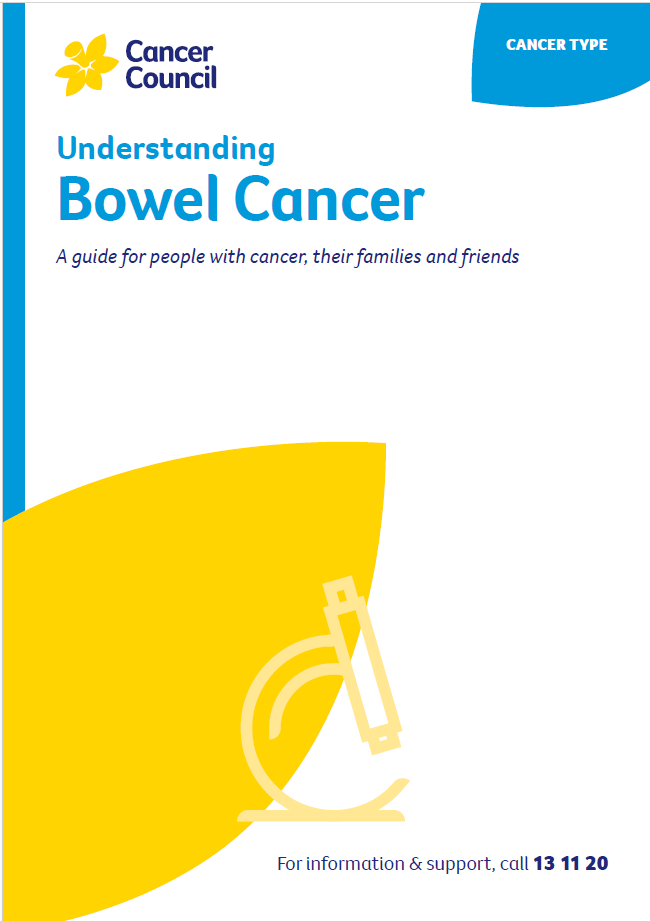- Home
- Bowel cancer
- Diagnosis
- Tests
- General tests
General tests for bowel cancer
Learn more about these general tests:
Physical examination
Your doctor will ask to feel your abdomen for any swelling. To check for problems in the rectum and anus, they may also do an internal examination. The doctor puts a gloved, lubricated finger into the anus to feel for any lumps or swelling. This is called a digital rectal examination (DRE). If you feel embarrassed or scared about a DRE, let your doctor know. A nurse may be present, but you can also ask for a family member or friend to be in the room with you for support.
The DRE may be uncomfortable, but it shouldn’t be painful. Because the anus is a muscle, it can help to try to relax during the examination. The pressure on the rectum might make you feel like you are going to have a bowel movement, but it is very unlikely that this will happen.
Blood test
You may have a blood test to check your general health and look for signs that you are losing blood from your bowel. The blood test may measure chemicals from your liver and check your red blood cell count (haemoglobin level). Having low red blood cells (anaemia) is common with bowel cancer, but it may also be caused by other conditions.
Learn more about blood tests.
Checking your faeces (poo) for signs of blood
A test called the immunochemical faecal occult blood test (iFOBT) looks for tiny amounts of blood in your faeces. It is commonly used as a screening test for bowel cancer.
An iFOBT is generally not recommended for people who are bleeding from the rectum or have other bowel symptoms (e.g. a change in bowel habit, anaemia, unexplained weight loss, abdominal pain). People with these symptoms are usually referred for a colonoscopy straightaway.
For an iFOBT, you usually collect a sample of your faeces at home. The sample is sent to a laboratory and examined for traces of blood, which may be a sign of polyps, cancer or another condition. Only a small number (around 3–4%) of positive iFOBT tests are due to cancer or large precancerous polyps; more commonly the traces of blood are from benign conditions like haemorrhoids. However, if the test finds blood in your faeces, your doctor will rrecommend you have a colonoscopy.
I had very light blood streaks on toilet paper when wiping my bottom. After 2 weeks of this, I went to my doctor thinking it was haemorrhoids but he sent me for a colonoscopy.
RICHARD
→ READ MORE: Tests to find cancer in the bowel
Podcast: Tests and Cancer
Listen to more episodes of our podcast for people affected by cancer
Understanding Cancer: Tests, Treatment and Support
Being told you have cancer can be overwhelming — but you’re not alone. This video explains what happens after a diagnosis, the different treatment options, and how Cancer Council can support you. Click on Settings ![]() to turn on auto-generated subtitles in your language.
to turn on auto-generated subtitles in your language.
More resources
Prof Alexander Heriot, Colorectal Surgeon and Director Cancer Surgery, Peter MacCallum Cancer Centre, Director, Lower GI Tumour Stream, Victorian Comprehensive Cancer Centre, VIC; Dr Cameron Bell, Gastroenterologist, Royal North Shore Hospital, NSW; Graham Borgas, Consumer; Prof Michael Bourke, Director of Gastrointestinal Endoscopy, Westmead Hospital, The University of Sydney, NSW; Laura Carman, 13 11 20 Consultant, Cancer Council Victoria, VIC; Amanda Connolly, Specialist Bowel Care Nurse, Icon Cancer Centre Windsor Gardens, SA; A/Prof Melissa Eastgate, Operations Director, Cancer Care Services, Royal Brisbane and Women’s Hospital, QLD; Anne Marie Lyons, Stomal Therapy Nurse, Concord Repatriation General Hospital and NSW Stoma Ltd, NSW; Lisa Nicholson, Manager Bowel Care Services, Bowel Cancer Australia, NSW; Stefanie Simnadis, Clinical Dietitian, St John of God Subiaco Hospital, WA; Rafi Sharif, Consumer; Dr Kirsten van Gysen, Radiation Oncologist, The Nepean Cancer and Wellness Centre, NSW; Sarah Williams, Clinical Nurse Consultant, Lower GI, Peter MacCallum Cancer Centre, VIC.
View the Cancer Council NSW editorial policy.
View all publications or call 13 11 20 for free printed copies.

